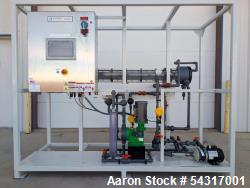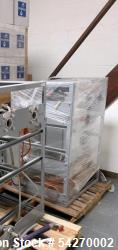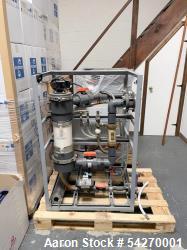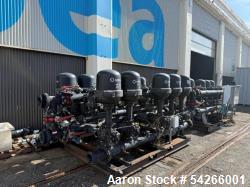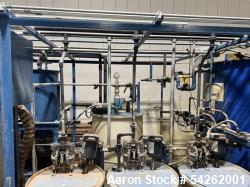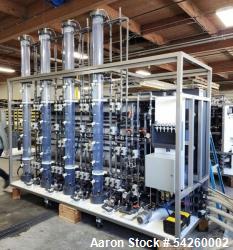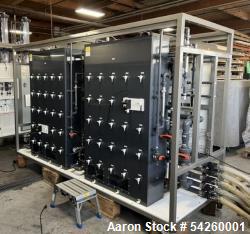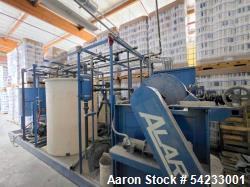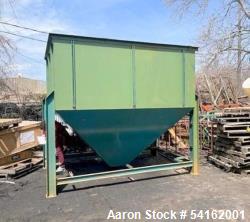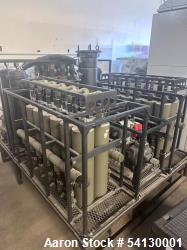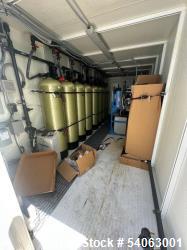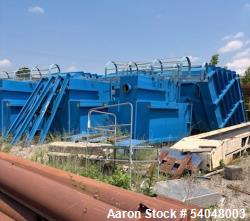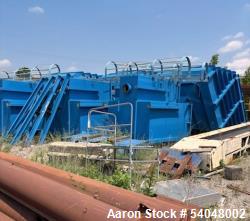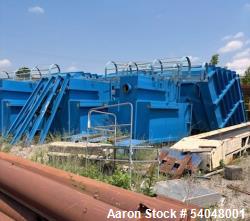Used Water Treatment Equipment
Aaron Equipment has a large inventory of reconditioned, unused, and used water treatment equimpent. Water treatment equipment is important for a facility’s water as it helps it become more suitable for any given use, whether for intake, production or even disposing. Each water treatment system varies, as it depends on what the needs of the specific facility.
The first municipal water treatment plant was built in Scotland by Robert Thom in the early 1800s. It employed a slow sand filtration system and was distributed by horse and cart. The US began its advancements in water treatment with sand later in the 1800s and has grown immensely over the last century. Water treatment equipment is made in a variety of forms, including air flotation systems, purification systems, sludge drying systems and more. Aaron Equipment sells water treatment plants as well. All these pieces of equipment speed up the natural processes by which water is purified and can be a great asset at any facility. If you are looking to sell your used water treatment equimpent submit a request online or contact Erik Eichert at 630-238-7480.
Making It Safe To Go In The Water: What To Know About Buying Used Water Treatment Equipment For Manufacturing
Purchasing used water treatment equipment can be innovative for manufacturers looking to cut costs without compromising quality. Using equipment can offer significant savings if you're interested in filtration, distillation, reverse osmosis, or other processes. However, making informed decisions is essential to ensure the equipment meets your needs and functions efficiently.
In this guide, we'll explore everything you need to know about buying used water treatment equipment, including the benefits, potential pitfalls, and tips for making the best purchase decision.
Benefits of Buying Used Water Treatment Equipment
- Cost Savings
One of the most significant advantages of purchasing used water treatment equipment is the cost savings. New equipment can be expensive, and buying used allows you to access high-quality machinery at a fraction of the price. This affordability is particularly beneficial for small to medium-sized manufacturers who must manage budgets carefully. - Availability
When you buy used equipment, you often have immediate access to the machinery you need. Unlike new equipment, which might be back-ordered or require a lengthy lead time, used equipment is usually available for quick purchase and installation. - Environmental Benefits
Opting for used equipment is an environmentally friendly choice. Reusing machinery reduces the demand for new resources and minimizes waste, contributing to a more sustainable manufacturing process.
Key Considerations When Buying Used Equipment
- Assess Your Needs
Before making a purchase, it's crucial to assess your specific needs. Determine which processes (such as filtration, distillation, or reverse osmosis) are essential for manufacturing operations. Understanding your requirements will help you focus on equipment that best suits your needs. - Condition and Maintenance History
Always inspect the condition of the equipment and request its maintenance history. Check for wear and tear signs and ensure all components function correctly. Knowing the maintenance history can provide insights into how well the equipment was cared for and its potential lifespan. - Compatibility and Integration
Ensure that the used equipment is compatible with your existing systems. Consider how it will integrate into your current manufacturing processes and whether any modifications will be necessary. This step is crucial to avoid additional costs or operational disruptions.
Types of Water Treatment Processes
- Filtration - Filtration is a common process in water treatment that removes impurities. Used filtration systems can vary widely in type, size, and function. It is essential to select a system that meets your specific requirements and can handle the volume of water your facility processes.
- Distillation - Distillation involves heating water to create steam, condensing it into liquid form, and leaving impurities behind. Used distillation equipment can be a cost-effective option, but it's important to ensure that it operates efficiently and has been properly maintained.
- Reverse Osmosis - Reverse osmosis is a process that removes contaminants from water by pushing it through a semi-permeable membrane. When purchasing used reverse osmosis equipment, check for any damage to the membranes and verify that the system's pressure settings are adequate for your needs.
- Alkaline Water Systems - Alkaline water treatment systems are designed to increase the pH level of water, making it less acidic. This type of equipment can be beneficial for specific manufacturing processes. Ensure that any used alkaline systems you consider function correctly and meet your operations' particular pH requirements.
- Evaporation - Evaporation is when water turns into vapor and then condenses into liquid form. This method is often used to concentrate solutions or recover valuable materials from wastewater. When buying used evaporation equipment, verify its efficiency and capacity to ensure it aligns with your production needs.
Tips for Purchasing Used Water Treatment Equipment
- Research Reputable Sellers - Work with reputable sellers who specialize in used industrial equipment. They can provide valuable insights and help you find equipment that meets your needs and budget. Review reviews and ask for references to ensure you work with a trustworthy seller.
- Request Documentation - Ask for all relevant documentation, including user manuals, maintenance records, and any certifications or warranties that may apply. Access to this information will help you understand how to operate and maintain the equipment properly.
- Consider the Total Cost of Ownership - While the initial purchase price is essential, consider the total ownership cost, including installation, maintenance, and potential repair expenses. This will give you a more accurate picture of the long-term costs associated with the equipment.
- Conduct a Thorough Inspection - Conduct a physical inspection of the equipment before purchase. Look for signs of wear, rust, or damage, and test the equipment to ensure it operates correctly. If you cannot inspect the equipment in person, request a detailed video or hire a third-party inspection service.
Conclusion
Buying used water treatment equipment for manufacturing can be a savvy choice, offering financial and environmental benefits. You can find reliable machinery that will enhance your manufacturing processes without breaking the bank by carefully assessing your needs, thoroughly inspecting equipment, and choosing reputable sellers.
Remember, the key to success is due diligence and making informed decisions. With the right approach, you can secure high-quality used equipment that meets your needs and helps your business thrive.
